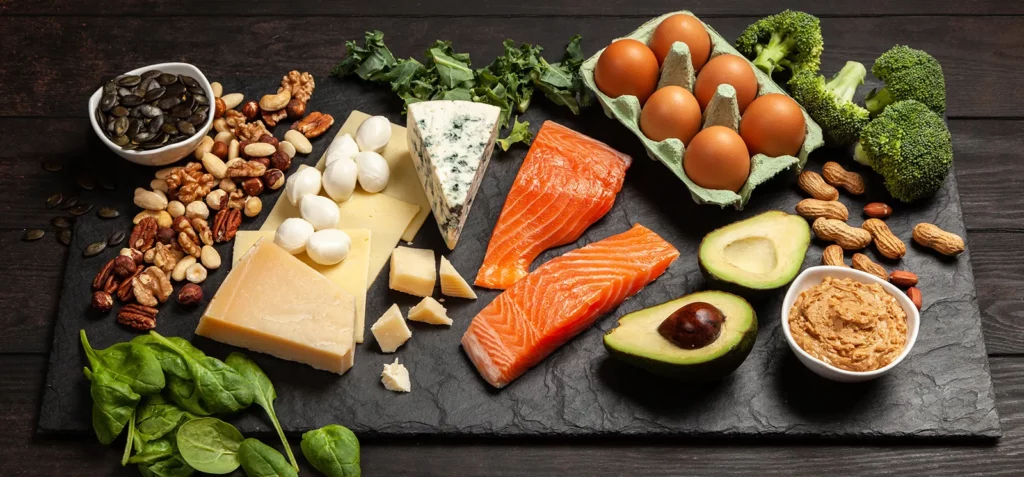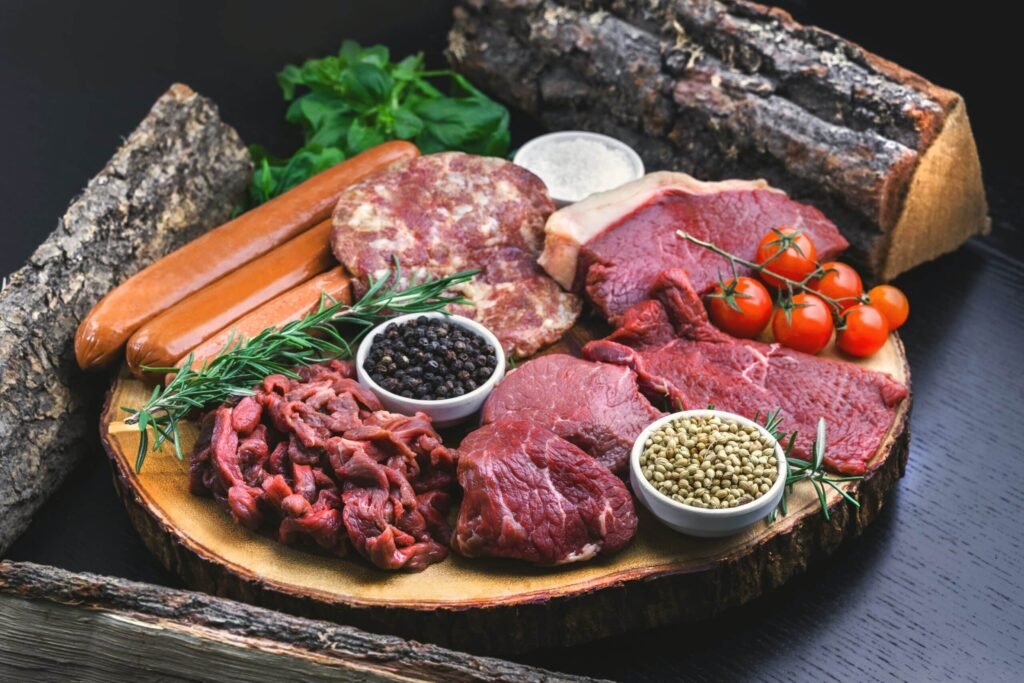The Keto Diet vs Carnivore Diet is two of the most popular low-carb diets today. While they have many similarities, there are also significant differences between them. The main difference between the Keto vs Carnivore diets is that the keto diet allows for the consumption of plants and plant-derived products.
Unlike the carnivore diet, the keto diet is a low-carb diet that encourages the consumption of exclusively animal food products.
Both diets involve eating fatty, nutrient-dense foods, and eliminating processed and high-carb foods. However, when it comes to Carnivore vs. Keto, one approach is better than the rest.
In this article, we are going to elaborate on some of the key points in the Keto Diet vs. carnivore.
What is the Ketovore Diet?
The Keto Diet is a high-fat, low-carbohydrate diet used for centuries to treat various medical conditions. This diet burns body fat instead of carbohydrates to save body energy. This process, known as ketosis, can lead to weight loss, increased energy levels, and other potential health benefits.
Some people choose to follow keto as an eating plan to lose fat and improve their health, including those with diabetes, those who are trying to build muscle, and those who are interested in general anti-aging. Keto is a low-carb diet that is high protein in healthy fats such as coconut oil, avocado, ghee, grass-fed butter, and MCT oil (medium-chain triglycerides). On a keto diet, you’ll be eating around 20 to 50 grams of carbs per day, depending on your individual needs and goals.
What is a Carnivore Diet?
A carnivore is a dietary approach that follows a diet that consists of only meat and water. Carnivore dieters consume no carbohydrates, no plant matter, and no dairy products.
The carnivore diet is also referred to as “zero carbs” or “meat-only” and is often followed as a way to promote rapid weight loss. Many fresh, organic, and unprocessed animal products, including beef, lamb, venison, chicken, turkey, eggs, and fish, are included in a carnivore diet.
Carnivore dieters also consume plenty of non-starchy veggies like broccoli, cauliflower, asparagus, spinach, and lettuce. Most people who are on a carnivore diet use seeds and nuts within their diet plan. Most people who follow a carnivore diet drink plenty of water and use supplements for essential nutrients.
Keto Diet Vs Carnivore Diet Difference
The Keto Diet Vs Carnivore Diet is similar in that both encourage you to eat more healthy fats, moderate protein, and eat fewer carbohydrates. Both diets also involve restricting your intake of sugars and refined grains and increasing your intake of healthy fats. Carnivore dieters eat no plant matter whatsoever, while keto dieters eat plenty of non-starchy veggies. Both diets have been shown to promote weight loss, improve insulin levels and increase vitality. Here is the carnivore keto diet food list below shown.
Carnivore Diet Food List
| Meat Type |
|---|
| Beef |
| Pork |
| Chicken |
| Turkey |
| Lamb |
| Organ Meats (liver, kidney, heart) |
| Fish (salmon, cod, tuna) |
| Eggs |
| Dairy Products (cheese, butter, heavy cream) |
| Bone Broth |
Ketovore Diet Food List
| Food Group | Allowed Foods |
|---|---|
| Meat and Poultry | Beef, pork, chicken, turkey, lamb, etc. |
| Seafood | Fatty fish (salmon, mackerel, sardines), shellfish (shrimp, crab, lobster) |
| Dairy | Butter, heavy cream, cheese, sour cream, etc. |
| Eggs | Whole eggs with yolks |
| Nuts and Seeds | Almonds, walnuts, chia seeds, flax seeds, pumpkin seeds, etc. |
| Low Carb Vegetables | Leafy greens (spinach, lettuce, kale), broccoli, cauliflower, bell peppers, etc. |
| Healthy Fats | Olive oil, coconut oil, avocado oil, etc. |
| Beverages | Water, coffee, tea, bone broth, etc. |
Benefits of following a Carnivore Diet
- Promotes Weight Loss: The carnivore diet has been shown to promote significant weight loss, especially when followed in conjunction with intermittent fasting.
- Improved Metabolic Health: Research shows that following a carnivore diet can improve biomarkers of metabolic health.
- Improved Sleep: Studies show that following a carnivore diet can significantly improve sleep quality.
- Increased Energy: Many carnivore dieters report an increase in energy levels, along with improvements in mood, mental clarity, and focus.
- Better Digestion: Studies show that eating a diet rich in animal proteins is good for optimizing digestive health.
- Environmental Impact: Eating a carnivore diet is more sustainable than most other diets.
- Healthier Heart: Studies show that following a carnivore diet can help lower blood pressure and reduce heart disease risk.
- Healthy Bones: Studies show that eating a diet rich in animal proteins is good for maintaining healthy bones.
Disadvantages of following a Carnivore Diet
- Lack of Variety: Eating the same foods day after day can quickly become boring and monotonous. Eating a more varied diet is linked to better overall health.
- Nutrient Deficiencies:Following a carnivore diet can lead to significant nutrient deficiencies, especially in vitamin B-12, iron, calcium, zinc, potassium, and magnesium.
- Loss of Muscle:Unlike keto diets, which encourage the consumption of sufficient protein to help build and maintain muscle, a carnivore diet is low in protein.
- Poor Gut Health:Many experts believe that following a carnivore diet leads to unhealthy gut bacteria and an imbalance in gut flora.
- Unsustainable:Following a carnivore diet is highly unsustainable, as it requires a lot of money and effort to source organic and ethically raised meat.
Benefits of following a Ketogenic Diet
- Weight Loss: Studies show that ketogenic diets can help you shed more pounds compared to other low-carb diets.
- Improved Blood Sugar: Studies show that following a ketogenic diet can help improve insulin levels and reduce the risk of developing type 2 diabetes.
- Better Brain Health: Studies show that following a ketogenic diet can help improve cognitive function and protect against conditions like Alzheimer’s disease.
- Reduced Anxiety: Studies show that following a ketogenic diet can help reduce anxiety and improve mood.
- Better Digestion: Studies show that ketogenic diets lead to improved gut health and overall digestive health.
- Increased Energy: Studies show that following a ketogenic diet can help increase energy levels, along with improved focus and mental clarity.
- Healthy Weight Loss: Keto diets involve eating fewer carbohydrates than what is recommended for a healthy diet, which leads to faster fat burning.
Disadvantages of following a Ketogenic Diet
- Lack of Variety: Following a ketogenic diet can quickly become monotonous, as the diet restricts the intake of many healthy foods.
- Nutrient Deficiencies: Research shows that following a ketogenic diet can lead to significant nutrient deficiencies, especially in calcium, magnesium, vitamin A, and vitamin E.
- Loss of Muscle: Unlike the carnivore diet, keto diets are not high in protein intake and can thus lead to loss of muscle mass.
- Unsustainable: Following a ketogenic diet is highly unsustainable, as it requires lots of time and effort to source a variety of healthy, unprocessed foods.
Which One is Healthier?
The Keto Diet Vs Carnivore Diet is both a low-carb diet that can help you lose weight and improve your health. There are many similarities between these two eating plans, but there are also plenty of differences.
Both the Keto Diet Vs Carnivore Diet have been proven to promote significant weight loss and improve metabolic health. Still, the carnivore diet is more sustainable and lacks the same risk of nutrient deficiencies as the ketogenic diet.
While following a carnivore vs keto for weight loss can be challenging to sustain, a ketogenic diet is much harder to follow, as it restricts many healthy foods and is hard to sustain long-term. For these reasons, we believe that the carnivore diet is the healthier eating plan of the two.
Conclusion
In conclusion, the comparison between the Keto and Carnivore diets showcases their effectiveness as low-carb strategies for achieving weight loss and enhancing metabolic well-being. Both diets, the ketovore diet plan, and the traditional carnivore approach, share common ground in their ability to deliver significant health advantages.
By significantly reducing carbohydrate intake, these diets initiate a metabolic state that promotes fat burning and can lead to remarkable weight loss outcomes. Furthermore, adherents of both diets often experience improvements in various markers of metabolic health, such as blood sugar levels and cholesterol profiles.
However, it’s crucial to recognize the difference between keto and carnivore diets. While both prioritize low-carb consumption, the ketovore diet plan incorporates a broader spectrum of nutrients by allowing certain low-carb vegetables.
This inclusion provides essential vitamins, minerals, and dietary fibers that might not be as readily available in the strict carnivore approach. The addition of ketovore vegetables not only diversifies the nutrient intake but also contributes to a more sustainable and balanced dietary regimen.
When deliberating whether to pursue the keto or carnivore path, it’s imperative to undertake thorough research and self-monitoring.
No single approach suits everyone, and individual responses to these diets can vary significantly.
Tracking your progress and attentively observing your body’s reactions will empower you to make informed decisions about which diet aligns best with your goals and lifestyle.
In essence, the keto vs. carnivore debate boils down to nuances in dietary composition and individual preferences.
The ketovore diet list showcases the potential for a combined approach that blends the benefits of both diets.
Ultimately, the choice between keto and carnivore should be based on a comprehensive understanding of their respective principles, coupled with a keen awareness of your body’s signals and feedback.
As with any dietary adjustment, consulting with a healthcare professional can provide personalized insights to guide your journey toward improved health and well-being.
FAQs
What is the difference between keto and carnivore diet?
The Keto Diet allows a mix of healthy fats, moderate protein, and some low-carb veggies. Carnivore Diet focuses solely on animal products, excluding plants. Keto offers nutritional variety, while Carnivore might lack nutrients due to its restrictions.
Which is Better for Weight Loss: Keto or Carnivore?
Both Keto and Carnivore diets can aid weight loss. Keto’s diverse food options could make it more sustainable. Carnivore’s ultra-low carb intake might lead to quicker results but could lack nutrients. Personal preference plays a role.
Can You Eat Cheese on Carnivore Diet?
The Carnivore Diet emphasizes animal-based foods. While some include cheese, it’s not a strict tenet. Experimentation with Carnivore recipes and ideas can determine what works best for you.


